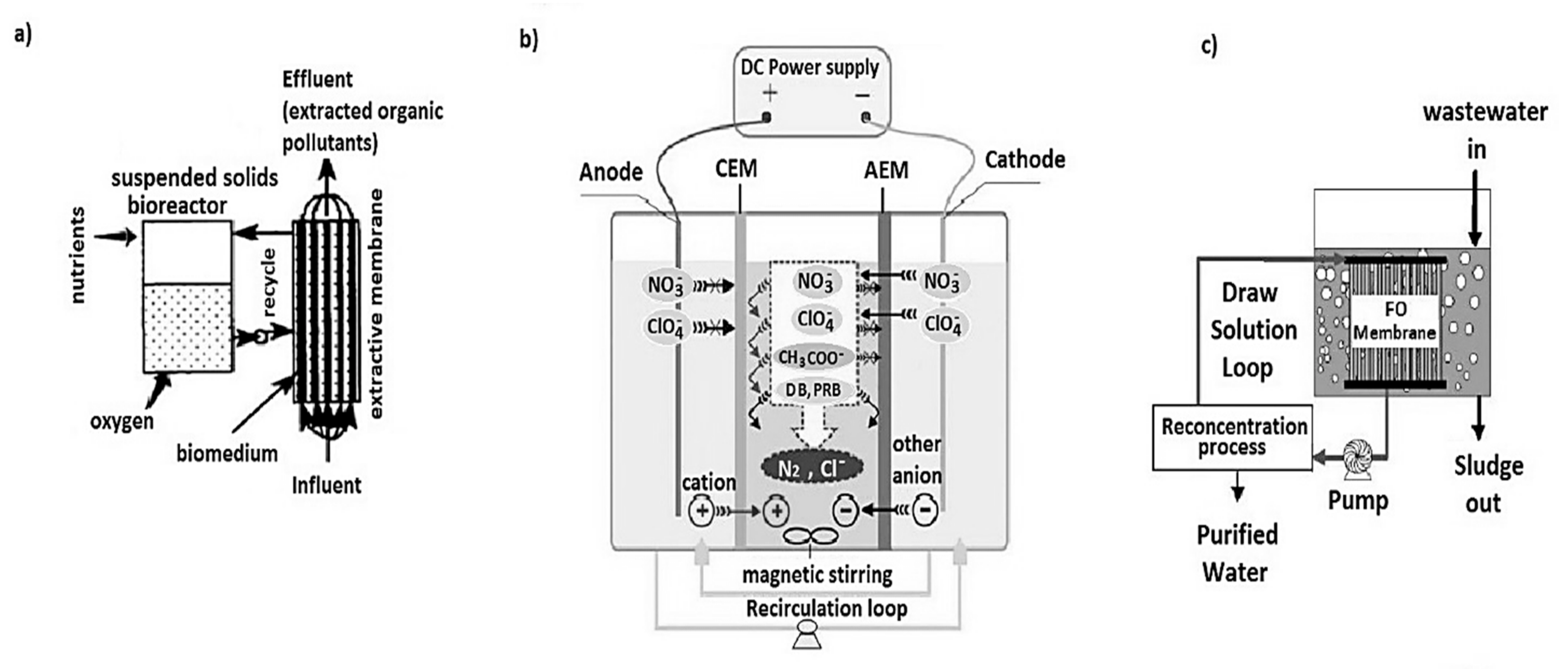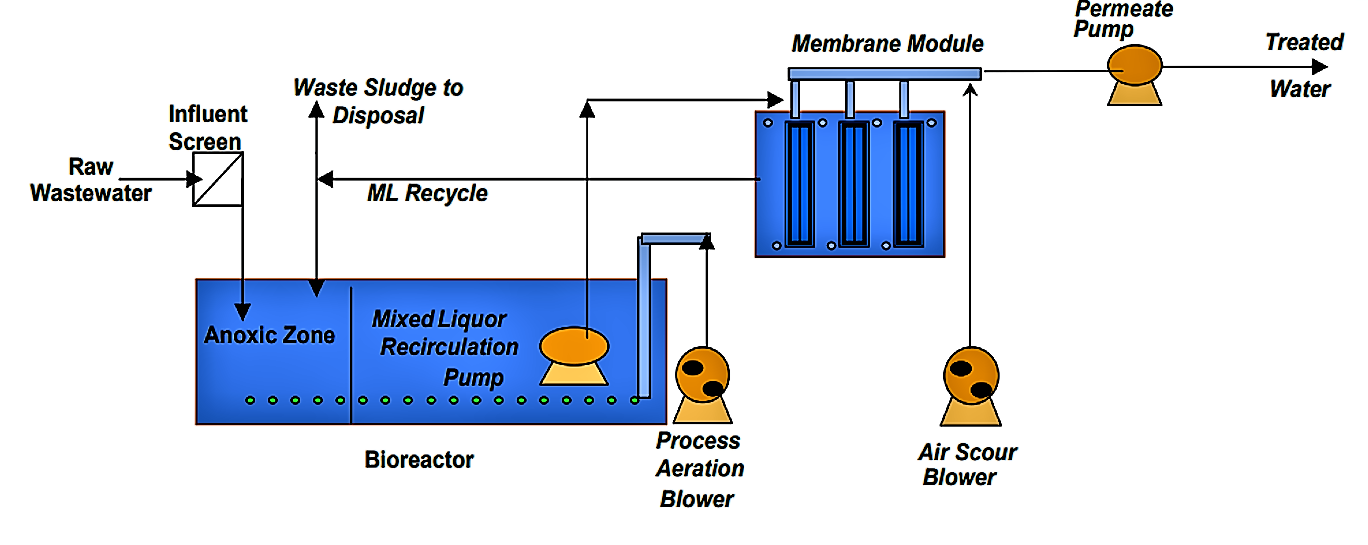How Membrane Bioreactor Technology Is Revolutionizing Wastewater Treatment
How Membrane Bioreactor Technology Is Revolutionizing Wastewater Treatment
Blog Article
Membrane Bioreactors Described: Reliable Solutions for Clean Water
Membrane bioreactors (MBRs) have emerged as an advanced option for attending to the pressing difficulties of wastewater therapy - Membrane Bioreactor. By integrating biological procedures with innovative membrane layer filtering, MBRs not just enhance the top quality of cured water however likewise decrease the spatial requirements of therapy facilities.

What Are Membrane Bioreactors?
Membrane bioreactors (MBRs) are sophisticated wastewater therapy systems that incorporate biological degradation procedures with membrane filtering innovation. This assimilation permits the efficient elimination of impurities from water, making MBRs a recommended choice in various applications, including metropolitan wastewater treatment and industrial effluent monitoring.

Among the essential advantages of MBRs is their ability to produce premium effluent, often ideal for reuse in watering or commercial processes. Furthermore, MBRs call for a smaller sized impact contrasted to traditional therapy systems, making them suitable for urban setups where space may be restricted.
Furthermore, MBRs can effectively manage varying influent lots and are less prone to the effects of poisonous shocks. These qualities add to their growing appeal as a sustainable remedy for resolving the boosting demand for clean water while minimizing environmental influences.
Exactly How Membrane Bioreactors Job
While the procedure of membrane bioreactors (MBRs) might appear complex, it fundamentally focuses on the synergy between organic processes and membrane layer filtration. MBRs incorporate an organic treatment procedure, usually triggered sludge, with a membrane separation unit to deal with wastewater efficiently.
In an MBR system, wastewater is initial introduced right into a bioreactor where bacteria break down natural matter and other contaminants. The organic activity reduces the concentration of toxins while promoting the growth of biomass. Following this biological therapy, the blended liquor goes through membrane filtering, which can be microfiltration or ultrafiltration, relying on the wanted effluent top quality.
The membrane layers work as a physical obstacle, permitting water and tiny solutes to pass while preserving suspended solids and larger particles. This enables the system to preserve a high focus of biomass within the reactor, improving the therapy effectiveness.
Moreover, the constant splitting up of cured water from the biomass helps with a compact design and decreases the footprint of the therapy center. Generally, the mix of organic degradation and membrane filtering in MBRs causes efficient and trusted wastewater treatment, guaranteeing premium effluent appropriate for different applications.
Advantages of MBR Technology
Among the essential advantages of membrane bioreactor (MBR) innovation is its capacity to produce top quality effluent with a considerably minimized impact compared to conventional wastewater treatment techniques. MBR systems successfully integrate organic treatment and membrane filtering, resulting in premium elimination of pollutants, consisting of suspended solids, microorganisms, and raw material. This capacity results in effluent that frequently meets or exceeds rigorous regulative criteria for reuse and discharge.
Additionally, MBR innovation permits greater biomass focus, which enhances the therapy performance and decreases the called for reactor quantity. This portable style is particularly beneficial in city locations where room is limited. The functional versatility of MBR systems likewise means they can adapt to differing influent top qualities and flow rates, making them appropriate for a wide variety of applications.
Furthermore, the minimized sludge manufacturing related to MBR processes adds to decrease operational and maintenance prices. The membranes serve as a physical obstacle, lessening the risk of clogging and making it possible for longer functional periods between cleansing. Generally, the benefits of MBR technology make it an attractive option for lasting wastewater treatment, attending to both ecological worries and the demand for effective resource administration.
Applications of Membrane Bioreactors
With their convenience and efficiency, membrane bioreactors (MBRs) locate applications throughout This Site various sectors, including local wastewater treatment, industrial processes, and even water reclamation. In community settings, MBRs provide a compact solution for dealing with wastewater, properly getting rid of impurities while simultaneously generating top quality effluent that meets strict regulatory requirements. This makes them especially appropriate for areas with minimal room.
In industrial applications, MBR innovation is utilized for treating process water, specifically in markets such as food and beverage, pharmaceuticals, and petrochemicals. These industries gain from MBRs' capacity to take care of high organic tons and their effectiveness in recovering important resources from wastewater, such as nutrients and water.
Additionally, MBRs play a crucial role in water improvement initiatives, enabling the Going Here reuse of treated wastewater for watering, commercial processes, and even as drinkable water after further therapy (Membrane Bioreactor). Their performance in eliminating microorganisms and contaminants makes them a reputable choice for making certain water high quality in various reuse applications
Future of Water Therapy Solutions
The future of water treatment remedies is poised for transformative innovations driven by technological innovation and raising environmental understanding. As global water shortage becomes a pressing issue, brand-new approaches, consisting of membrane layer bioreactor (MBR) systems, are readied to play a critical duty in enhancing the performance and sustainability of water treatment procedures.
Arising innovations such as expert system and equipment knowing are expected to enhance treatment procedures, enabling real-time tracking and predictive upkeep. This will boost the general integrity and performance of water treatment centers. Moreover, developments in membrane layer materials, such as graphene and nanofiltration, guarantee to enhance permeation prices and decrease fouling, bring about reduced energy consumption and functional prices.
Furthermore, the assimilation of renewable resource sources into water therapy plants will certainly add to greener practices. The round economy version will certainly likewise get grip, motivating the healing of useful resources from wastewater, such as nutrients and energy.
Final Thought

Membrane bioreactors (MBRs) have actually emerged as an advanced service for addressing the pushing difficulties of wastewater treatment. By incorporating organic procedures with innovative advice membrane filtering, MBRs not only boost the high quality of treated water yet additionally minimize the spatial demands of treatment centers.One of the key benefits of membrane bioreactor (MBR) modern technology is its ability to create premium effluent with a substantially reduced footprint contrasted to conventional wastewater treatment approaches.With their flexibility and performance, membrane bioreactors (MBRs) locate applications across numerous industries, consisting of community wastewater therapy, industrial processes, and also water reclamation.In verdict, membrane layer bioreactors represent a significant advancement in wastewater therapy modern technology, incorporating organic procedures with efficient membrane purification to create premium effluent.
Report this page